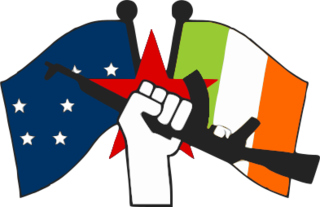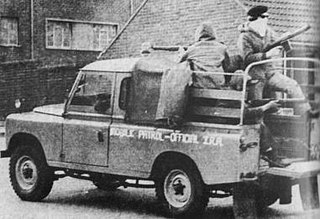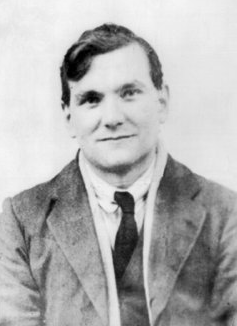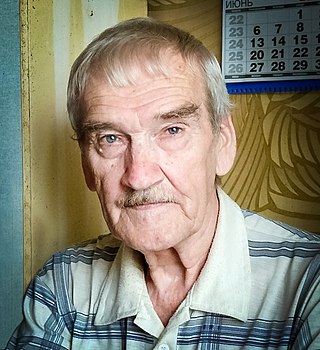Related Research Articles

The Easter Rising, also known as the Easter Rebellion, was an armed insurrection in Ireland during Easter Week in April 1916. The Rising was launched by Irish republicans against British rule in Ireland with the aim of establishing an independent Irish Republic while the United Kingdom was fighting the First World War. It was the most significant uprising in Ireland since the rebellion of 1798 and the first armed conflict of the Irish revolutionary period. Sixteen of the Rising's leaders were executed starting in May 1916. The nature of the executions, and subsequent political developments, ultimately contributed to an increase in popular support for Irish independence.

Yuri Vladimirovich Andropov was a Soviet politician who was the sixth leader of the Soviet Union and the fourth General Secretary of the Communist Party of the Soviet Union, taking office in late 1982 and serving until his death in 1984.

The Irish National Liberation Army is an Irish republican socialist paramilitary group formed on 8 December 1974, during the 30-year period of conflict known as "the Troubles". The group seeks to remove Northern Ireland from the United Kingdom and create a socialist republic encompassing all of Ireland. With membership estimated at 80–100 at their peak, it is the paramilitary wing of the Irish Republican Socialist Party (IRSP).

The Official Irish Republican Army or Official IRA was an Irish republican paramilitary group whose goal was to remove Northern Ireland from the United Kingdom and create a "workers' republic" encompassing all of Ireland. It emerged in December 1969, shortly after the beginning of the Troubles, when the Irish Republican Army (IRA) split into two factions. The other was the Provisional IRA. Each continued to call itself simply "the IRA" and rejected the other's legitimacy.

The Sino-Soviet split was the gradual worsening of relations between the People's Republic of China (PRC) and the Union of Soviet Socialist Republics (USSR) during the Cold War. This was primarily caused by doctrinal divergences that arose from their different interpretations and practical applications of Marxism–Leninism, as influenced by their respective geopolitics during the Cold War of 1947–1991. In the late 1950s and early 1960s, Sino-Soviet debates about the interpretation of orthodox Marxism became specific disputes about the Soviet Union's policies of national de-Stalinization and international peaceful coexistence with the Western Bloc, which Chinese leader Mao Zedong decried as revisionism. Against that ideological background, China took a belligerent stance towards the Western world, and publicly rejected the Soviet Union's policy of peaceful coexistence between the Western Bloc and Eastern Bloc. In addition, Beijing resented the Soviet Union's growing ties with India due to factors such as the Sino-Indian border dispute, and Moscow feared that Mao was too nonchalant about the horrors of nuclear warfare.

The Irish Citizen Army, or ICA, was a small paramilitary group of trained trade union volunteers from the Irish Transport and General Workers' Union (ITGWU) established in Dublin for the defence of workers' demonstrations from the Dublin Metropolitan Police. It was formed by James Larkin, James Connolly and Jack White on 23 November 1913. Other prominent members included Seán O'Casey, Constance Markievicz, Francis Sheehy-Skeffington, P. T. Daly and Kit Poole. In 1916, it took part in the Easter Rising, an armed insurrection aimed at ending British rule in Ireland.

James Larkin, sometimes known as Jim Larkin or Big Jim, was an Irish republican, socialist and trade union leader. He was one of the founders of the Irish Labour Party along with James Connolly and William O'Brien, and later the founder of the Irish Worker League, as well as the Irish Transport and General Workers' Union (ITGWU) and the Workers' Union of Ireland. Along with Connolly and Jack White, he was also a founder of the Irish Citizen Army. Larkin was a leading figure in the Syndicalist movement.

The Communist Party of Ireland (CPI) is a Marxist–Leninist party, founded in 1970 and active in the Republic of Ireland and Northern Ireland following a merger of the Irish Workers' Party and the Communist Party of Northern Ireland. It rarely contests elections and has never had electoral success. The party is a member of the International Meeting of Communist and Workers' Parties. Throughout the period of the Cold War, the CPI openly aligned with the Soviet Union. During the Troubles, the party procured some arms for the faction which became the Official IRA. The party closely supported the Cuban Revolution and campaigns such as the Birmingham Six. Minor splits from the CPI included the Eurocommunist-inspired Irish Marxist Society.

Michael O'Riordan was the founder of the Communist Party of Ireland (3rd) and also fought with the Connolly Column in the International Brigades during the Spanish Civil War.

William Joseph Mellows was an Irish republican and Sinn Féin politician. Born in England to an English father and Irish mother, he grew up in Ashton-under-Lyne before moving to Ireland, being raised in Cork, Dublin and his mother's native Wexford. He was active with the Irish Republican Brotherhood and Irish Volunteers, and participated in the Easter Rising in County Galway and the War of Independence. Elected as a TD to the First Dáil, he rejected the Anglo-Irish Treaty. During the Irish Civil War Mellows was captured by Pro-Treaty forces after the surrender of the Four Courts in June 1922. On 8 December 1922 he was one of four senior IRA men executed by the Provisional Government.

Maurice Twomey was an Irish republican and the longest serving chief of staff of the Irish Republican Army (IRA).

Roderick James Connolly was a socialist politician in Ireland. He was also known as "Roddy Connolly" and "Rory Connolly".

The Cold War from 1979 to 1985, was a late phase of the Cold War marked by a sharp increase in hostility between the Soviet Union and the West. It arose from a strong denunciation of the Soviet invasion of Afghanistan in December 1979. With the election of Prime Minister Margaret Thatcher in 1979, and American President Ronald Reagan in 1980, a corresponding change in Western foreign policy approach toward the Soviet Union was marked by the rejection of détente in favor of the Reagan Doctrine policy of rollback, with the stated goal of dissolving Soviet influence in Soviet Bloc countries. During this time, the threat of nuclear war had reached new heights not seen since the Cuban Missile Crisis of 1962.
Provisional Irish Republican Army arms importation in forms of both firearms and explosives began in the early 1970s during the Troubles. With these weapons it conducted an armed campaign against the British state in Northern Ireland.
Operation RYAN was a Cold War military intelligence program run by the Soviet Union in the early 1980s, when they believed the United States was planning for an imminent first strike attack. The name is an acronym for Raketno-Yadernoe Napadenie. The purpose of the operation was to collect intelligence on potential contingency plans of the Reagan administration to launch a nuclear first strike against the Soviet Union. The program was initiated in May 1981 by Yuri Andropov, then chairman of the KGB.
The Mitrokhin Archive refers to a collection of handwritten notes about secret KGB operations spanning the period between the 1930s and 1980s made by KGB archivist Vasili Mitrokhin which he shared with the British intelligence in the early 1990s. Mitrokhin, who had worked at KGB headquarters in Moscow from 1956 to 1985, first offered his material to the US' Central Intelligence Agency (CIA) in Latvia, but they rejected it as possible fakes. After that, he turned to the UK's MI6, which arranged his defection from Russia.

Viktor Mikhailovich Chebrikov was a Soviet public official and security administrator and head of the KGB from December 1982 to October 1988.

On 26 September 1983, during the Cold War, the Soviet nuclear early warning system Oko reported the launch of one intercontinental ballistic missile with four more missiles behind it, from the United States. These missile attack warnings were suspected to be false alarms by Stanislav Petrov, an engineer of the Soviet Air Defence Forces on duty at the command center of the early-warning system. He decided to wait for corroborating evidence—of which none arrived—rather than immediately relaying the warning up the chain of command. This decision is seen as having prevented a retaliatory nuclear strike against the United States and its NATO allies, which would likely have resulted in a full-scale nuclear war. Investigation of the satellite warning system later determined that the system had indeed malfunctioned.
The Soviet Union and some communist states have sponsored international terrorism on numerous occasions, especially during the Cold War. NATO and the Italian, German and British governments saw violence in the form of "communist fighting organizations" as a serious threat.
The following activities were or are supposed to have been carried out by the Committee for State Security (KGB) in Peru.
References
- ↑ Carr, EH The Bolshevik Revolution 1917–23, vol 3 Penguin Books, London, 4th reprint (1983), pp. 257–258. The draft treaty was published for propaganda purposes in the 1921 British document Intercourse between Bolshevism and Sinn Fein (Cmd 1326).
- ↑ McGeever, Brendan (25 March 2016). "The Easter Rising and the Soviet Union: an untold chapter in Ireland's great rebellion". openDemocracy. Retrieved 3 August 2019.
- ↑ Keown, Gerard (10 March 2016). First of the Small Nations: The Beginnings of Irish Foreign Policy in the Inter-War Years, 1919-1932. Oxford University Press. ISBN 9780191062414 – via Google Books.
- 1 2 3 4 5 "The secret IRA–Soviet agreement, 1925". History Ireland. 6 March 2013. Retrieved 3 August 2019.
- ↑ MacEoin, Uinseann (1997). The IRA in the twilight years: 1923–1948 (PDF). Dublin: Argenta. p. 116. ISBN 9780951117248. Archived from the original (PDF) on 17 May 2020. Retrieved 8 May 2020– via Irish Military Archives.
- ↑ Casey, Maurice (26 August 2015). "Northern Ireland Under Soviet Eyes". History to the Public. Archived from the original on 3 February 2020. Retrieved 3 August 2019.
- ↑ "KGB armed Official IRA, book reveals". 16 February 2011.
- ↑ "'Official' IRA hid 5,000 AK-47s in secret bunkers". Independent.ie. 31 May 2015.